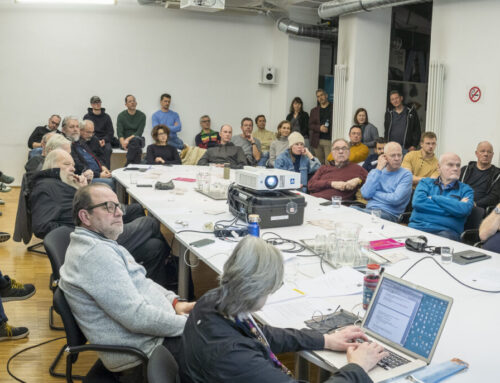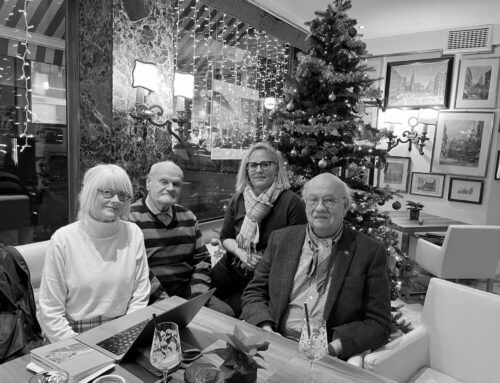INTRODUCTION
Since 2005, the EU XXL Forum has brought together representatives and stakeholders of the European audiovisual sector on an annual basis to discuss EU policies concerning this unique sector, which has its own dynamic and characteristics, and to ensure that the needs of audiovisual creators receive the necessary attention on a European level.
Media, audiovisual services, creative industries, and the cultural sector as a whole have great potential in terms of innovation, competitiveness, growth, and job creation. They are also key in preserving and promoting the rich cultural and linguistic diversity in the EU.
We, the signatories of the EU XXL Resolution 2011, discussed the following subjects during the “EU XXL Forum”, held from 13 to 16 April in Linz, Austria, in order to arrive at our common point of view on recent European legislative developments and policies relevant to the European audiovisual sector – because we, the audiovisual creators, like other creators, are entitled to be heard by politicians.
EU XXL Forum 2011: The Topics
-
International Coproductions – Tried and Tested or Room for Improvement?
-
Models for the Future or Water under the Bridge? The Role of the Collecting Societies in National and European Comparison
-
Rights, Remuneration, and Working Conditions – The Outrageous Demands of the Creatives: Paid Work
-
Working without Borders – Thinking and Working in Cultural and Linguistic Territories
-
The Danube Cultural Cluster Conference, Workshop “Focus: FILM!” (11 March 2011)
1. International Coproductions – Tried and Tested or Room for Improvement?
International coproductions are a major challenge and, at the same time, the best way to present audiovisual works to a larger number of viewers. In this manner, works by local filmmakers can be brought to an international audience.
a) Raise the awareness of cross-border cooperation – coproductions and cofinanced productions – as it fosters cultural exchange.
b) Every coproduction should also result in an exchange of jobs between the participating countries. Pure cofinancing shouldn’t happen without a mutual obligation to strengthen the structure of the audiovisual industry reciprocally and creating jobs in all of the involved countries.
c) Ask the EU to find instruments that facilitate international/bilateral agreements on cofinancing in order to better reach the goals of European integration and an internal market for the audiovisual sector.
d) Support for traditionally established cooperations between producers in the various member states as well as the candidate countries. e) Facilitation of EU funding for cross-border cooperations (MEDIA). Coordination of the funding
institutions and simplification of the administrative procedures. f) Facilitation of access to movie theatres for coproduced films, especially in smaller markets. g) To this end, increased funding for movie theatres in order to motivate them to show smaller
coproductions. h) Improve administrative cooperation between member states in order to simplify and reduce the costs of e.g. visa and work permits for international coproductions.
i) Set up a network of “European Cultural Industry Agencies of Coproduction” that represents European coproductions in key international markets outside of Europe and enables access to international markets with the aim of promoting European film heritage. These agencies should develop specific schemes for facilitating coproductions with non-European countries (see MEDIA Mundus).
j) Cross-border cooperation must be ensured for all audiovisual agents, regardless of their size, in order to guarantee not only cultural diversity but also diversity of entrepreneurship, which ultimately benefits the consumer.
2. Models for the Future or Water under the Bridge? The Role of the Collecting Societies in National and European Comparison
It appears that collecting societies had taken steps to establish common rules of conduct, such as the CISAC (International Confederation of Societies of Authors and Composers) professional rules, but regrettably they have not been adequately promoted or implemented.
The leading role of collecting societies in collecting rights management shall be strengthened. On the one hand, they are an indispensable link between creators and the users of their work. Any EU regulation will affect the livelihood of creators and the uses to which their works are put. But also the cultural and social role of collecting rights management societies/organisations cannot be stressed enough. Instead of perceiving collecting societies as pillagers and looters, consumers should recognise them as a very important and efficient tool for the protection of authors’ rights and cultural diversity. Collecting societies are founded by and for authors; they are not simply data collecting institutions. Minimum standards should be set on an EU level for their qualification and constitution as an “Authors’ Rights Management Society”. These standards must comprise structure, governance, transparency, accountability, and cultural/social compromise. Audiovisual authors rely on income from completed work to compensate for unpaid periods before a next commission.
2.1. Pre-requisites for Taking Up Operation as a Collecting Society:
a) Constitution as a non-profit organisation.
b) Presentation of democratic statutes that guarantee transparency.
c) Presentation of a report on economic viability.
d) Accreditation that the constitution guarantees or enhances general national interests in the
protection of authors’ rights.
e) Accreditation that the collecting society will promote a social function regarding its members.
f) Following the evaluation and review of the documents and reports, ministerial authorisation to
confirm the adequacy of the constitution with regard to the interests of its members and other
general interests, especially the protection of authors’ rights.
2.2. Conditions for Authorisation
a) Contracting obligation with rights owners and users of protected works.
b) All decision-making bodies and their supervisory boards must be composed on a parity basis with representatives from each creative sector being part of the collective rights societies.
2.3. Requisites for Taking Up Operation as a Collecting Society/Internal Structure
a) Contract of admission with members, which should not exceed five years but can be renewed for an undetermined time. It does not matter if the contract is based on a transmission of rights, a mandate, or any other legal solution, but it has to be guaranteed that a collecting society can act in the interest of its members in court and in front of any user of its repertoire without special formal requisites.
b) Statutory stipulation of maximum administration costs.
c) Management and control bodies must be equally staffed with members from each sector. The principle of non-discrimination must be inherent.
d) “Mixed appointments” (a same person in the management and control bodies of several collecting societies) should be prohibited.
e) It is also important to pay due heed to the vertical integration of the media industry when members of management and control bodies are being appointed.
2.4. Cultural/Social Operations and Functions in the Public Interest
a) Solidarity levies, promotions, social assistance, cultural subsidies, scholarships, prizes, etc. – whether from the general fund, from non-distributable monies, or from revenue from the levies for blank media and copying equipment – are justified insofar as they have democratic legitimacy, are allocated transparently, and are open to all persons entitled to payment.
b) These forms of financial support are crucial for the development and production of contemporary art and alleviating cases of social hardship.
c) Legislation should enable and oblige collecting societies to dedicate a percentage of their income to cultural and social purposes. The distribution of these funds must always be under the sovereignty of the relevant collecting societies and exclude any possibility for state authorities to deprive funds in order to cover social measures that should be prefinanced by the state’s budget.
2.5. Transparency
a) Greater transparency and harmonised requirements for collecting societies are needed in order to create a Europe-wide standard.
b) The publication of tariffs, allocation formulas, annual accounts, and information on reciprocal agreements – also on the Internet. Furthermore, it would be helpful when this information is available not only in the native language, also with regard to the conditions of general contracts with exploiter groups.
c) Information on management costs: Costs depend on the source of earnings and the amount of work for the right concerned. All costs must be comprehensible to the persons entitled to benefit. The management costs should be as low as possible and should be calculated in a transparent way that is fair to all.
d) Use of uniform work coding standards (ISAN: audiovisual work code; ISWC: musical work code; ISRC: recording code; IPI: performer code) and interoperability: Collecting societies have to supervise the codes and take action against any abuse – including enforcement through the courts.
e) The exchange of information between collecting societies (in particular to prevent unilateral dumping conditions).
2.6. Supervision/Control over Collecting Societies and Their Activities
a) The ideal supervision model for collecting societies would be an interplay between voluntary control by those entitled to payment and control by an efficient, independent, transparent, and informed body of experts who take into account all aspects: financial, cultural, social, and legal.
b) Cancelling authorisation of a collecting society’s constitution by the ministry alone is insufficient. A framework of administrative sanctions is required in order to impose sanctions on collecting societies themselves and their organs. The regulatory bodies of the Audiovisual Media Services (AVMS) could potentially also be responsible for the supervision of collecting societies.
2.7. Arbitration Mechanisms
a) In the member states, right holders, users, and collecting societies should have the possibility to access both arbitration agencies and the courts.
b) The mandate, composition, and procedure of national arbitration agencies should be compatible throughout the EU and could possibly be inspired by the mediation and arbitration services currently provided by the World Intellectual Property Organization (WIPO).
2.8. Miscellaneous
a) The endeavour to consolidate diverse databases of musical works into a “Global Repertoire Database”, with the capital costs of such a database being shared between societies, shall be encouraged.
b) Authors should have freedom of choice regarding the management of their rights: The authors should be free to decide which society is entrusted with their rights and to move their repertoire between societies – without the fragmentation of their repertoire.
c) Principally, the transmission of rights should be exclusive in order to avoid legal insecurity and major administrative costs or burden. d) The author cannot be denied the privilege to personally manage his or her rights.
3. Rights, Remuneration, and Working Conditions
Normally, audiovisual authors transfer their economic rights to the producer and their fees are negotiated individually, resulting in the practice where creatives receive a lump sum payment. Only rarely do they receive any additional payment from the producer in the case of the extraordinary success of the audiovisual work’s exploitation. Furthermore, they suffer under bad working conditions. The EU has the right to intervene directly only if health is endangered. A binding regulation and supervision of working conditions throughout Europe as a basis for rigorous sanctions in case of infringement are needed.
3.1. Strengthening the Author’s Position
a) Authors need enhanced protection by IP Contract Law for offline and online exploitation and a system of sanctions imposed by law in the case of non-compliance by the exploiter.
b) Authors must have an unwaivable right to remuneration for each act of exploitation of their work, especially with regard to online distribution.
c) Authors should have an unwaivable right to remuneration for their “making available” right based on revenues generated from online distribution and collected mandatorily by collecting societies.
d) All audiovisual authors must have unwaivable moral rights that entitle them, at the minimum, to be named as the author and to oppose false attribution, to preserve the integrity of the audiovisual work after completion of post-production, and consequently to object any derogatory treatment such as colourisation, destruction of the work, inappropriate or derogatory context, modification of duration, etc. Nevertheless, some AV authors, like cinematographers, might claim flexibility in case that their creative contributions have a double legal protection because of co-authorship (in the AV work) and individual authorship (photography).
e) When one is an author or a co-author he or she should in no case forfeit his or her intellectual property, regardless whether he or she is self-employed or has a regular employee’s contract.
f) EU legislation should prohibit “buy-out” contracts of economic exploitation rights, cessio legis regulations, and broad statutory assumption of deemed assignment to the producer – especially the lump sum payments based on “buy-out” contracts need to be abolished.
g) Given the great differences in the regulation of remuneration for blank storage media, which is collected by the national collecting societies, harmonisation is needed. On a European level it should be determined in a mandatory form for which blank media (CD, DVD, mobile phones, hard disks, computer, USB sticks, etc.) and reprographic machines (printer, scanner, photocopiers, etc.) remuneration should be levied.
h) It is important to ensure fair contractual terms for authors, both offline and online. Granting new and improved authors’ rights to audiovisual authors on a Europe-wide basis is an essential measure, but not enough. These rights must be inalienable.
i) Solutions are proposed regarding the finances for the mass digitisation and rights clearance of national libraries’ collections and broadcasters’ archives.
j) Solutions are required regarding the regulation of the exploitation of “orphan works” in the field of audiovisual heritage for commercial purposes, with a guarantee for a fair share for the audiovisual authors.
k) In the case of exclusive transmission of rights to a third party, the third party must assume all obligations resulting from the contract between the author and the prior rights owner.
l) Collecting societies shall continually inform their members and allottees about their rights and obligations through information meetings and provide their members and allottees with an understanding of the complexity of their work in order to achieve a more active participation of all artists in the policy-shaping process and matters of the internal structure. Only informed members and allottees can provide their collecting society with a sufficient mandate.
m) In most cases the AV work has several co-authors, beside the directors, such as the cinematographer or the editor.
3.2. Improving the Working Conditions
a) All film productions must follow the national laws and regulations concerning working time and working conditions.
b) This should be an explicit condition in the funding agreements. If there is call for an exemption, this has to be explained and justified in accordance with national regulations. The appropriate permits must be obtained.
c) When assessing the application, the funding body must evaluate the feasibility of the production plan and the level of the budget in terms of the working conditions.
d) It must also be checked that the production plan is in compliance with collecting agreements where available.
e) The EU must introduce explicit requirements for all funding bodies on national and regional levels. In order to do so, a sanction system has to be implemented. In case of a breach, the sanctions could be as follows: 1.) A 2-year exclusion from funding 2.) A mandatory test concerning labour law and regulations 3.) Controls on the set of the next production
f) Funding by the MEDIA programme (and EURIMAGES) should include the same requirements and sanctions.
g) Social dialogue in the audiovisual sector on European level should be intensified and all relevant stakeholders and professional organisations must be part of the dialogue.
h) Professional organisations within the audiovisual sector should establish a pan-European agreement on working conditions, and this should be formally included as part of the convention for coproductions.
i) This agreement should include regulations concerning the mobility of workers in the EU.
j) The Directorate-General Culture and the Directorate-General Employment should take concrete and coordinated steps to deal with the issue of working conditions in the European audiovisual sector and take into account the special needs of the sector.
k) In response to issues of age discrimination and old age poverty in the film sector, the EU has to introduce effective measures that guarantee a sustainable existence for older people (>40) in the industry.
l) Introduction of basic rights for freelance workers to be represented in social partner negotiations and to benefit from collective bargaining. m) The rules for self-employed should be under the same framework as that for employed creatives.
4. Working without Borders – Thinking and Working in Cultural and Linguistic Territories
As most of the concrete demands that were mentioned during this discussion are identical to those mentioned during the special workshop “Focus: FILM!” (Please refer to footnote for a summary and the list of participants1) organised by EU XXL FILM in the framework of the Danube Cultural Cluster
Conference2 on 11 March 2011, we have decided to merge these two points. Please refer to 5).
5. The Danube Cultural Cluster Conference
The EU Strategy for the Danube Region provides good development prospects for the audiovisual industry given the structures, initiatives, and institutions already present in the Danube region. Increased networking in the Danube region could be highly beneficial – now it is necessary to take further steps in the formation of cultural clusters, especially for film.
1 http://www.eu-xxl.at/upload/Minutes_DCC_EN.pdf http://en.danubecluster.eu
a) Creation of a “Danube” brand.
b) Creation of Danube audiovisual clusters.
c) Creation of contact points on behalf of regional film funds and location services.
d) Member states shall use a part of the regional fund to support the creative sector in order to strengthen the Danube region as a cultural and economic area and develop a “Danube Region” fund.
e) Specific support to facilitate access to audiovisual works from neighbouring regions within the Danube region.
f) Introduction of specific transnational funding for subtitling to enhance the circulation of audiovisual works in the Danube region.
g) Introduction of specific incentives for better circulation of audiovisual works within neighbouring regions in the Danube region.
h) Tax incentives for filmmakers in the Danube region.
i) Political, administrative, and financial support to enhance closer cooperation between several neighbouring regions.
j) Improving the mobility of artists.
k) Inclusion of the economy in order to finance the cluster.
l) Inclusion of all various ethnic groups – majorities and minorities – to raise the awareness of the cultural richness in the Danube region.
m) Already existing funding programmes like MEDIA, EAVE, etc. shall be specifically aligned to the Danube Strategy.
n) A joint programme shall be developed to become familiar with the various protagonists and stimulate a better understanding between them.
The EU XXL Resolution 2011 is backed by the following organisations:
European Federation of Cinematographers European Composer & Songwriter Alliance www.imago.org www.composeralliance.org
European Council of Artists AUSTRO MECHANA www.eca.dk www.aume.at
CinePecs International Film Festival International Film Festival Zadar www.cinepecs.hu www.filmforumzadar.com
The EU XXL Resolution 2011 is partly backed by:
Federation of European Film Directors www.filmdirectors.eu
Explanatory note:
-
FERA supports the Co-Production (1.) and the Danube-section (5.)
-
FERA supports the section 3.2 (Improving the Working Conditions)
-
FERA decided to reserve judgement on the Collecting Societies section (2.)
ANNEX – Informal European Media Policy Meeting (IEMPM), May 20th in Krems/Austria
Once a year, representatives of the European umbrella organisations of the creative sector meet in the framework of the IEMPM with representatives of the three EU institutions to discuss relevant measures, legislative initiatives and current challenges on European level and to find sustainable solutions.
Participants
|
Albrecht-Stadler, Katharina |
EU XXL Film |
|
Auinger, Christian |
Austrian Federal Ministry of Justice |
|
Brazda, Kurt |
AAC/IMAGO |
|
Busch, Cristina |
IMAGO |
|
Cser, Ágnes |
Member of the European Economic and Social Committee |
|
|
(EESC) |
|
Echerer, Mercedes |
EU XXL Film |
|
Lichtenberger, Eva |
Member of the European Parliament, Vice-Chair, Group of |
|
|
the Greens/European Free Alliance |
|
Mayer, Kurt |
Dachverband der Filmschaffenden/FERA |
|
Niemann, Fritz |
EU XXL Film |
|
Winkler-Komar, Brigitte |
Austrian Federal Ministry for Education, Arts and Culture! |
|
|
(bm:ukk) |
|
Zajacz, Paul |
EU XXL Film |
|
Zotti, Stefan |
European Commission, Member of Cabinet of Johannes |
|
|
Hahn, Commissioner for Regional Policy |
Annotations
During the Informal European Media Policy Meeting (IEMPM), which EU XXL FILM held up in Krems/Austria on May 20th 2011, the following annotations to the Resolution were mentioned by the participants:
Ad Nr 1 lit i: Money shall not be spent in administrational programs but in production.
Ad Nr 2.2 lit b: As part of the essential redistribution, all decision-making bodies and their supervisory boards must be staffed for no longer than three years (ideally two years) with the possibility to be reappointed. It is necessary to limit the terms of office in order to prohibit the emergence of power through inheritance (also Nr 2.3 lit c) and to limit the possibility to be re-elected (only two times).
Add Nr 2.2 c: Reasonable representation of the allottees in the CMOs. Legal betterment for the allottees compared to the cooperative members. Participation in the decision-making process, higher than the right to be consulted or to submit comments. Anchoring the Principle of open membership.
Ad Nr 2.3 lit a: The right of not licensing can be changed in a right of common licensing for the start-uppers comparable to the Creative Commons licensing system. See also Nr 2.8 d.
Ad Nr 2.3 lit a: “Contract of admission with members, which should not exceed five years but can be renewed for an undetermined time. “ The five year limit for rights administration agreements does not create an additional value for the author, on contrary: The CMO has additional costs, because thousand contracts must be renewed each year. By the way these contracts can be terminated under respect of the time limits. Replace “which should not exceed five years but can be renewed for an undetermined time” with “with the right to terminate within a reasonable period”. “It does not matter if the contract is based on a transmission of rights, a mandate, or any other legal solution, but it has to be guaranteed that a collecting society can act in the interest of its members in court and in front of any user of its (please insert – annot.) “individual and common” repertoire without special formal requisites (please insert – annot.) “for claims on common repertoire”.
Ad Nr 2.3 lit c: The governing bodies must reflect the diversity of the Member States’ repertoire, targeted to the respective domestic market. The governing bodies shall be composed on a gender basis. By law, the rights to delegate and to nominate can be anchored.
Ad Nr 2.3 lit d: In the field of Controlling: Building a guide for the professionalization of the governing bodies.
Ad Nr 2.4 lit c: There must be EU wide comparable guides that take into account the cultural and social needs.
Add Nr 2.4 d: Europe can be the “leading horse” for a worldwide treaty. CMOs are rights managers and stakeholders at the same time. On national and on European level there shall be structural forms of support.
Ad Nr 2.5 lit e: (Delete paragraph). Alternatively formulate “comprehensible” exchange of information “through mutual monitoring, especially about reciprocity agreements. They shall not circumvent tariffs and be to the author’s disadvantage”.
New Nr 2.6 lit c: Gender-conscious notation in the allocation of the controlling bodies.
Add Nr 2.8 e: A provider remuneration model must be established for Cloud Computing. Cloud Computing implicates enormous problems in the field of rights enforcement.
Add Nr 3.2 n: The involvement of the Council of the Regions and the European Economic and Social Committee is necessary. The self-employed must be inspected in every Member State. The Audiovisual Social Dialogue Committee must increase its visibility and effectivity. The mobility of the artists cannot be compared to the mobility of other workers. The European Commission must organize transnational collective bargaining.
Add Nr 3.2. o: The principle of non-discrimination must be enforced throughout the AV sector. A major problem is rising when health care is not settled on a stringent legal base as well as the danger limits. The EU has no competence in here. Social rights and insurance lie in national competence.
Add Nr 5 o: The Danube Cultural Cluster can help the EU in its neighbourhood policy, boost its extern smart policy and its external relations. Some problems can be better solved on a macro-regional level. The three No´s appeal only on EU level, not on the national one. Smart Specialization Strategies like the Danube Strategy are the groundkeepers of innovation.
Add Nr 5 p: There must be rules to adjust the non-central governed funding bodies. Strengthening the regional identity serves the safeguarding of languages and cultures. The existing structures must be put together and the main focus should be laid on the Regional Intermediary. It has to be made clear what a region defines, what is specifying the region.
New Nr 5 lit q: All the Danube countries should establish regional AV funds, because these formations could be flexible enough to foster co-production and strengthen cross-border projects as well as the structures.
|
Contact and Information |
|
|
Fritz Niemann, Project Manager |
Paul Zajacz, Project Manager |
|
EU XXL FILM – FORUM FOR EUROPEAN FILM |
EU XXL FILM – FORUM FOR EUROPEAN FILM |
|
Vienna, Austria |
Vienna, Austria |
|
fritz.niemann@eu-xxl.at |
paul.zajacz@eu-xxl.at |
|
www.eu-xxl.at |
www.eu-xxl.at |
|
EU XXL FILM – FORUM FOR EUROPEAN FILM |
|
|
Schrankgasse 12/3, 1070 Wien |
|
|
T +43 1 4081140-0 |
|
|
F +43 1 4081140-20 |
|
|
office@eu-xxl.at |
|
|
www.eu-xxl.at |
|
|
© EU XXL FILM – FORUM FOR EUROPEAN FILM, 31th May 2011 |
|





























